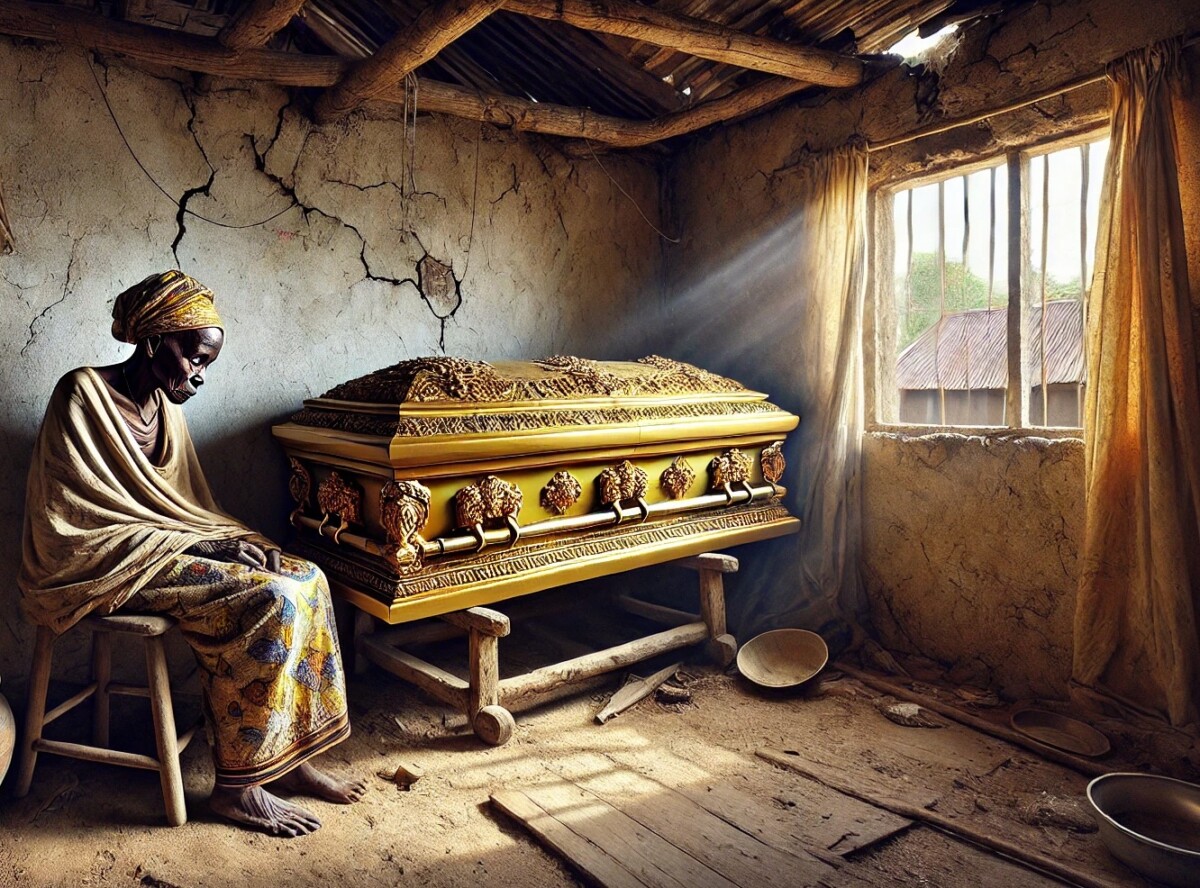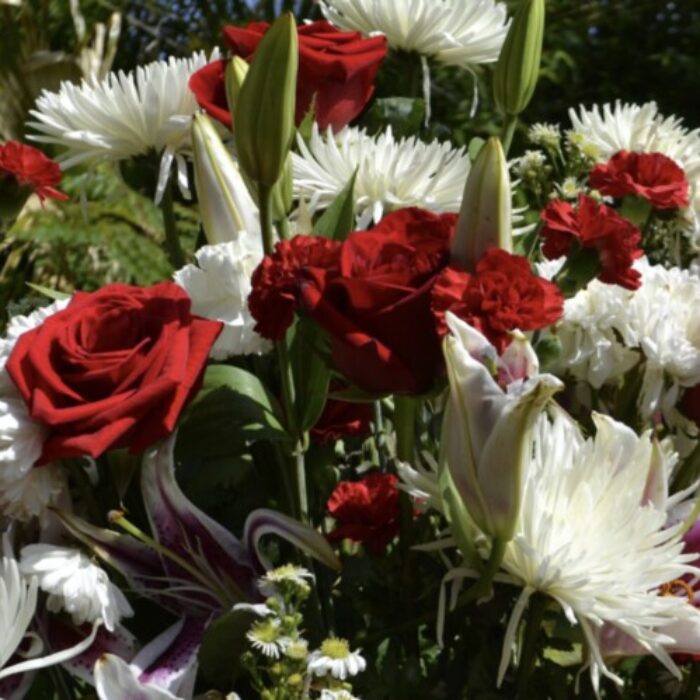By Nnaoke Ufere, PhD
In Nigeria, a profound divide exists in how the dead are honored or dishonored.
On one side are those who truly celebrate the passing of loved ones, particularly the elderly, with genuine reverence, unshaken dignity, and heartfelt sincerity. For them, honoring the dead starts long before death—through acts of kindness, compassion, and steadfast support during life’s struggles and victories. Their focus is on investing in extending and preserving life rather than on elaborate burials.
Their funerals are not marked by ostentatious displays but by the quiet dignity of gratitude, love, and respect, ensuring that the memory of the deceased is cherished for the life they lived, not the spectacle of their passing. We should look to these Nigerians as examples of genuine care and dedication to the living over excessive focus on the dead.
For this reason, this group exemplifies the ethos of a “good death”—one where every possible effort is made to provide much needed support to sustain life, where the ailing are surrounded by unwavering care and love, and the comforting presence of family members. In this sacred moment of death, prayers are offered, hands are held, and the soul is gently eased into the afterlife with dignity and peace.
On the other side looms a far larger group, whose actions expose a glaring and painful hypocrisy. In life, they turned their backs on their loved ones, offering neglect where care was needed, indifference where compassion was due, and abandonment in moments of dire need. Yet, in death, they unleash extravagant wealth, orchestrating ostentatious burials that drip with excess—lavish displays of vanity masquerading as honor.
For these individuals, a funeral is not an expression of reverence but a hollow performance, a desperate attempt to mask their failure to offer love and support when it truly mattered. From incurring heavy debts to hosting extravagant feasts, their fixation on appearances transforms funerals into stages for social competition, stripping them of the dignity and respect they should embody.
More often than not, their opulent burials serve not to celebrate the life of the deceased but to absolve themselves of guilt and gain the approval of onlookers. It is a tragic betrayal, where the true essence of love and care is replaced by hollow pageantry, turning death into a spectacle for external validation and praise.
In this guilt-driven pretense, families who neglected to offer basic care and support to their loved ones during life now pour significant resources into grandiose burial ceremonies, hosting feasts that serve more as public displays of wealth than genuine expressions of respect and mourning. The true tragedy lies in the stark contrast between the neglect experienced by the deceased in life and the extravagance lavished upon them in death.
This hypocrisy becomes even more glaring when we consider the mockery of what is often called a “celebration of life” during burials—the carefully curated obituary photos of radiant, smiling versions of the departed, the ostentatious list of wealthy mourner-donors, the fantastical eulogies dripping with exaggerated praise, the glossy brochures packed with hollow platitudes disguised as tributes, and the self-righteous biographies that canonize the deceased into instant sainthood.
Look closer at the uniformed family members in their matching, overpriced outfits, the self-styled royal high chiefs bedecked in regalia as though attending a coronation, the lavish golden casket flaunted like a trophy, the corpse adorned in an expensive designer dress, the canopies wrapped in colorful drapes and adorned with artificial flowers, and the choreographed, casket-carrying or ball-bearing troupe performing with exaggerated New Orleans-style matching band theatrics. It’s all a sham, a hollow spectacle of vanity and pretense, masking a grim reality we dare not confront.
Beneath the glittering pomp and pageantry lies a devastating truth: the person now enshrined in that opulent golden casket died in agony and isolation, starving and confined to a squalid, filthy room, their frail body ravaged by untreated bedsores. This is what I call a “bad death”—a tragic end defined by neglect, unbearable suffering, abandonment, and the aching void left by the absence of human connection.
Their final breath was taken in a cold, indifferent hospital or in heartbreaking isolation at home, without a single loved one to hold their hand, no comforting voice to soothe their pain, and no familiar presence to offer even a shred of dignity in their final moments.
For years, the deceased was left to fend for themselves, their cries for care and companionship ignored, overshadowed by the relentless pursuit of self-interest and petty infighting by those who now gather in exaggerated displays of grief. The deceased was ignored in life, offered no warmth, no love, no meaningful presence, yet those same people now parade their grief in death as if it could erase the void they left behind.
The neglect and abandonment don’t end with the lavish burial—they merely shift focus. Visit the burial site a few years later, if you can even locate it, and you’ll likely find it overgrown with weeds, the grave sunken and crumbling, left to decay as a stark reminder of misplaced priorities.
Meanwhile, if the deceased left behind a spouse and children, they are often abandoned to struggle and fend for themselves, forgotten as quickly as the feasting guests disperse. The extravagant ceremony, meant to honor the dead, becomes a fleeting spectacle, while the memory of the departed fades into obscurity, lost amid the glaring indifference of those who claimed to care.
Next time you find yourself at one of these sham performances masquerading as a celebration of life, don’t be fooled. The ostentatious display of affection and the exaggerated tributes serve a singular purpose: to absolve the guilt of those who abandoned the deceased in their moments of greatest need, a lavish attempt to atone for years of neglect and suffering. The opulent celebration is nothing more than a hollow apology to the dead.
These Nigerians hold on to the illusion that a lavish send-off can erase years of neglect, avoiding the uncomfortable truth that genuine care and respect are demonstrated during life, not after death.
Meanwhile, a complicit and unquestioning public—including religious leaders, elites, the media, politicians, townspeople, and community influencers—eagerly consume the facade, reveling in the spectacle while willfully ignoring the painful truth it hides.
You can hear them declare with pride: “He or she was buried with dignity befitting a royal!”—as if a golden casket and overpriced ceremony could somehow cleanse years of neglect, indifference, or even outright abandonment. The applause rings loud, the eulogies overflow with hollow praise, and the crowd nods in approval, celebrating not the life lived, but the fortune spent.
Together, they amplify the farce, celebrating excess as virtue and mistaking opulence for dignity. What a devastatingly tragic and farcical culture, where collective complicity normalizes neglect and suffering and elevates pretense over genuine humanity.
Of course, there are those reading this article who will not summon the courage to accept this bitter truth. They hide their heads under the cloak of custom, insisting that extravagant funerals are traditional expression of respect and love, all while conveniently overlooking the neglect and indifference that characterized their relationship with the deceased during their lifetime.
The statistics are sobering. While no federal agency keeps track of the number of Nigerians who die suffering alone, local data from hospitals across the states suggest that more than five out of ten Nigerians die miserable and alone, with men disproportionately affected.
Of the 2.7 million Nigerians who died in 2023 (United Nations/World Population Prospect, 2023), it is estimated that about 1.5 million died poor and alone. For many, their last moments were marked not by the soothing presence of loved ones but by silence, isolation, or the cold indifference of an empty dark room.
This perversion of extravagance in death is not confined to the likes of Obi Cubanas, Udom Emmanuels, Obiagboso Enukemes, Emeka Offors, or the Zencos of our society. It extends deep into the fabric of our communities, villages, and families, where even those of modest means stretch themselves to the brink of financial ruin to host extravagant burials.
Case 1: Mr. Okoye Loneliness in Life and Lavish Funeral in Death
In a small village in Anambra State, Nigeria, Mr. Okoye, a retired teacher, spent his final years alone in his crumbling home, and surviving on a meager teacher’s pension, when paid. Once a pillar of the community, he was gradually forgotten by his children, who had moved to Lagos, Abuja and Kano in pursuit of wealth and success. His pleas for visits, financial support, or even a phone call often went unanswered.
The same children who ignored his struggles in life spared no expense for his funeral when he passed. While they busied themselves with plans for his extravagant burial and lavishly transformed their father’s rundown village home into an opulent mansion, his body lay forgotten for 12 months on the floor of a cold storage room, buried under hundreds of others, like a frozen mackerel subjected to relentless freeze-thaw cycles.
In any other culture, this treatment constitutes abuse of a corpse, defined as treating a human body in a manner that would outrage ordinary family sensibilities. Neglected in life and dishonored in death, Mr. Okoye endured indignities that no individual should suffer.
Case 2: Mama Alade’s Final Days in a Hospital Ward
In a Lagos hospital, Mrs. Alade, a widowed trader in her late 70s, spent her final weeks on a crowded hospital ward. Her children, busy with their careers and families, rarely visited, leaving her to face the hot, sterile hospital environment alone. The nurses, overwhelmed by the number of patients, could only offer minimal attention. In her last moments, she whispered for her family, but none were there to hold her hand or ease her passage.
Days after her lonely death, her children returned with ostentatious plans for her burial, including a gold-plated casket, a parade of luxury cars, and a star-studded guest list. The spectacle masked the emptiness of Mama Alade’s final days, a stark reminder of the growing disconnect in our society that once prided itself on familial care.
Case 3: Dr. Amadi’s Heartbreak
Dr. Amadi entrusted his uncle with caring for his widowed mother while sending regular funds from the U.S. Initially, things seemed fine, but over time, communication grew irregular, and Amadi discovered the uncle had misused the funds on personal luxuries, neglecting his mother entirely. Her health deteriorated, and she died alone in a hospital in Owerri before Amadi could return.
Adding to the heartbreak, a “burial committee” of people who had ignored her in life, including his uncle, quickly formed, demanding extravagant funeral arrangements, including a new house and long list of funeral expenses “befitting of a doctor’s mother.”
The event became less about honoring her memory and more about showcasing vanity and social status, highlighting the tragic disconnect between care in life and excess in death. They sought to bury their guilt beneath layers of ostentation, as though a lavish burial could erase the pain of her lonely and forgotten final days. It was not a celebration of life—it was an exhibition of hypocrisy.
These tragic stories of neglect in life and extravagance in death underscore the deep-seated rot at the core of our present society, where appearances are valued over substance, and public displays of wealth take precedence over genuine compassion and responsibility.
What Can Be Done to Prevent This Tragedy of Neglect in Life and Extravagance in Death
To break the cycle of neglecting loved ones in life and compensating with extravagance in death, we must confront this societal flaw with practical solutions and cultural introspection. Here are actionable recommendations:
1. Cultural Reorientation Through Education
Our communities need a cultural reawakening that prioritizes care and respect for loved ones during their lifetime. Schools, religious institutions, and social groups should lead campaigns promoting the value of compassion and consistent support over performative rituals after death.
2. Emulate the Hausa (Muslim) Burial Culture
The simplicity and dignity of the Hausa Muslim burial culture provide an excellent model. Their practice focuses on quick, modest burials without ostentatious displays, emphasizing the equality of all in death. Nigerians across all ethnic and religious divides can adopt elements of this tradition to curb unnecessary extravagance.
3. Introduce Taxes on Extravagant Burials
Extravagant burials should be discouraged through economic disincentives. A progressive tax on lavish ceremonies and ostentatious funeral expenditures would serve as a deterrent, redirecting resources toward more meaningful uses, such as healthcare and education for the living. LGAs should set baseline thresholds for reasonable funeral expenses, categorized by average costs. Expenditures exceeding these thresholds would be subject to taxation.
4. Promote Modesty in Funerals
Religious and traditional leaders must take a firm stand against the growing culture of excess in burials. They should advocate for modest, dignified ceremonies that respect the deceased without devolving into a public competition of wealth and praise. Churches and community leaders should establish a guideline limiting the duration a body can remain in the mortuary before burial, with a maximum of 10 days.
5. Encourage Living Tributes
Families should be encouraged to celebrate their loved ones while they are alive, whether through honoring elderly parents, offering consistent support, or simply spending quality time together. These living tributes ensure that love and care are felt in life, where they matter most.
6. Highlight Role Models of Compassionate Living
The media should spotlight individuals and families who prioritize genuine care over posthumous displays. Stories of those who invest in their loved ones’ well-being while they are alive can serve as a counter-narrative to the glorification of extravagant funerals.
7. Strengthen Social Support Systems
Our governments and communities must work together to improve access to healthcare, elder care, and support for vulnerable individuals. When we provide a safety net, families are less likely to neglect their loved ones due to financial or systemic constraints.
8. Redefine Social Prestige
We must shift our perception of status from ostentation to meaningful contributions. Acts of kindness, care, and public service should be celebrated and elevated above the superficial display of wealth during burials.
9. Reject Lavish Burials while you’re alive
Clearly communicate to your loved ones that extravagant ceremonies are neither a measure of love nor a meaningful legacy. Reject it while you’re alive. Encourage them to honor your life by channeling resources into impactful actions, such as supporting those in need, investing in community development, or strengthening family bonds.
In sum, these recommendations call for a shift in both individual mindsets and collective values. By fostering a culture that emulates simplicity, discourages wastefulness, and prioritizes care for the living, we can put an end to the tragic paradox of neglect in life and extravagance in death.





